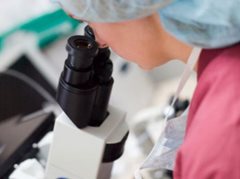 A sophisticated new microscope makes it possible for fertility doctors to monitor the developing fertilised egg continuously for up to five days, also making it possible for parents to watch their developing baby in video from conception.
A sophisticated new microscope makes it possible for fertility doctors to monitor the developing fertilised egg continuously for up to five days, also making it possible for parents to watch their developing baby in video from conception.
It means any abnormal changes can be spotted and the egg discarded so only the best quality ones with the best chance of creating a healthy pregnancy are transferred to the womb. The technique has led to one in every two couples achieving a successful pregnancy, doctors said. The remarkable images show the egg dividing first into two cells, then four and so on until the developing embryo 'hatches' out of the egg and is ready to implant in the womb. Parents who successfully have a baby using the new technique can obtain a video of this "magical" moment.
Currently clinic staff have to remove the developing embyro from its incubator to look at it under a microscope and this can only be done once a day. This may miss vital mistakes and abnormal changes in the development which could jeopardise the chance of a successful pregnancy. Care, the UK's biggest private provider of fertility services, has installed the Embryoscope at its Manchester clinic. It is the first time it has been used to treat patients in Britain.
So far over 1,500 embryos from 200 patients have been monitored using the device and it has boosted pregnancy rates. With traditional monitoring one in three patients fell pregnant at Care and this has increased to one in two following Embryoscope monitoring. The first babies have been born and there are 74 other women currently pregnant after using the new technique.
Alison Campbell, Head of Embryology at Care said: “Currently, assessment of embryos in IVF is limited to brief snapshot glimpses at defined time points, usually one per day, involving removal from the incubator. "However, embryo development is a dynamic process and the use of time lapse imaging with the EmbryoScope enables the growth and activity of each stage to be observed continuously by the embryologist without removing them from incubation. “The ability to view continuous embryo growth helps us to observe abnormal development, and exclude embryos that are not ideal for implantation.
"Eggs are injected with sperm and then placed into the EmbryoScope for fertilisation and development to take place. "Images are taken every few minutes and viewed as time lapse video by the embryologists until the point of embryo transfer, usually three or five days later. The ability to study these images in a closed system allows us to more accurately select the most viable embryo for transfer into the patient. "Early assessment of this technology demonstrates that the new, valuable information is delivering improved pregnancy rates.”
Isabella Potter from Wigan is just three weeks old and was the first baby born using the technique. Her mother Gemma Potter, 27, a primary school teacher, said: “She is our little miracle. We are so happy, we have been shouting from the rooftops for three weeks.
"To see her as an embryo was so special. Up until now no parent has seen their child at that magical moment of life. "To think that Isabella, lying in my arms now, was that tiny speak when she started out, as we all are, was so precious. None of us have ever seen ourselves at the very start of life but Isabella will be able to. "We will show her the time lapse video when she older along with all the pregnancy scans."
Mrs Potter and her husband Simon, 33, a software engineer, had been trying for a baby since 2007. Mr Potter said: "Seeing the time lapse images was mindblowing." They were referred to Care Manchester and conceived Isabella on the first cycle of IVF. The treatment was funded by Ashton, Wigan & Leigh Primary Care Trust. Embryoscope monitoring is being charged at £750 per cycle and includes videos of the developing embryo that the parents can keep. A typical cycle of standard IVF treatment costs around £5,000.
Article: 20th April 2012 www.telegraph.co.uk
Read more about IVF and fertility treatment options at www.prideangel.com